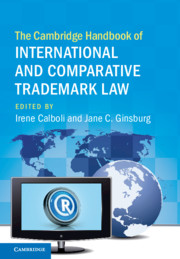Book contents
- The Cambridge Handbook of International and Comparative Trademark Law
- The Cambridge Handbook of International and Comparative Trademark Law
- Copyright page
- Contents
- Editors and Contributors
- Foreword
- Preface
- Part One International Aspects of Trademark Protection
- Part Two Comparative Perspectives on Trademark Protection
- I The Nature and Functions of Trademarks
- II Signs That Can Be Protected as Trademarks
- III Public Policy Limitations of Trademark Subject Matter
- IV The Relationship between Trademarks and Geographical Indications
- V Certification and Collective Marks
- VI The Relationship between Trademark Law and Advertising Law
- VII The Relationship between Trademark Law and the Right of Publicity
- VIII Trademarks and Domain Names
- IX Overlapping Rights
- X Theories Underlying the Standards for Trademark Infringement
- XI Trademark Dilution
- XII Secondary Trademark Liability
- XIII Trademark Defenses
- XIV The Principle of Exhaustion of Trademark Rights
- 35 Common Law and Civil Law Approaches to Trademark Exhaustion in Europe
- 36 The Relationship between Trademark Exhaustion and Free Movement of Goods
- XV Trademark Transactions
- Index
35 - Common Law and Civil Law Approaches to Trademark Exhaustion in Europe
The Distribution Function of Trademarks
from XIV - The Principle of Exhaustion of Trademark Rights
Published online by Cambridge University Press: 18 September 2020
- The Cambridge Handbook of International and Comparative Trademark Law
- The Cambridge Handbook of International and Comparative Trademark Law
- Copyright page
- Contents
- Editors and Contributors
- Foreword
- Preface
- Part One International Aspects of Trademark Protection
- Part Two Comparative Perspectives on Trademark Protection
- I The Nature and Functions of Trademarks
- II Signs That Can Be Protected as Trademarks
- III Public Policy Limitations of Trademark Subject Matter
- IV The Relationship between Trademarks and Geographical Indications
- V Certification and Collective Marks
- VI The Relationship between Trademark Law and Advertising Law
- VII The Relationship between Trademark Law and the Right of Publicity
- VIII Trademarks and Domain Names
- IX Overlapping Rights
- X Theories Underlying the Standards for Trademark Infringement
- XI Trademark Dilution
- XII Secondary Trademark Liability
- XIII Trademark Defenses
- XIV The Principle of Exhaustion of Trademark Rights
- 35 Common Law and Civil Law Approaches to Trademark Exhaustion in Europe
- 36 The Relationship between Trademark Exhaustion and Free Movement of Goods
- XV Trademark Transactions
- Index
Summary
This chapter examines the exceptions to the so-called principle of exhaustion pursuant to which a trademark proprietor has no authority to control by virtue of their exclusive right the further commercialization of trademarked goods already placed on the market with their consent. The chapter focuses on German and UK law as they stood before the harmonization of trademark laws in Europe to juxtapose the civil and the common law approaches to the same legal problem. In particular, it examines the circumstances under which the exclusive right in a trademark may be relied upon to exercise control over the distribution channels that carry the product to the ultimate consumer. It then turns to appreciate the role of trademark rights in safeguarding the integrity of distribution networks. In that regard, it will focus on the exceptions to the principle of exhaustion as these apply under the current legal framework of the European Union trademark system. A more detailed review of the principle of trademark exhaustion in the EU is provided by Irene Calboli in her corresponding chapter on the exhaustion doctrine (Chapter 36). Calboli also discusses trademark exhaustion in the United States and other selected jurisdictions to highlight the relationship between trademark exhaustion and free movement of goods in the context of cross-border trade.
- Type
- Chapter
- Information
- Publisher: Cambridge University PressPrint publication year: 2020



